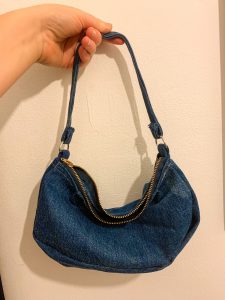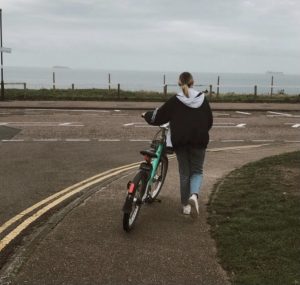 Over the past couple of years I’ve been learning a lot about the environment and each individual’s impact on it. I’ve found some easy ways you can make more sustainable choices in 2021.
Over the past couple of years I’ve been learning a lot about the environment and each individual’s impact on it. I’ve found some easy ways you can make more sustainable choices in 2021.
My New Year’s resolution – pre-loved
Over Lockdown, the poor treatment of workers and strain the fashion industry puts on the environment became apparent. Therefore, in 2021 I am hoping to cut as much fast fashion and new clothing out as possible. Instead I will reduce, reuse and recycle my clothes. With online shopping so easy and at affordable prices, even doing massive sales, it has become so convenient to buy huge hauls of clothes that we just don’t need and are poor quality so don’t last. If something is broken, rather than buying new, try to fix it or replace it with a second hand version. Charity shops, thrift shops and apps like Depop and Vinted are a great way to find pre-loved clothes and often for a lot cheaper. Rather than throwing your clothes in the bin and straight to landfill, try to sell them or donate them. If you do have to buy something new, try to shop at ethical shops and buy clothes made from organic fabrics, such as organic cotton (but look out for what percentage of it is actually organic as some places sell items as organic and it’s only 10% – this is called ‘greenwashing’).
Why not try up-cycling? Rather than throwing away an item of clothing you don’t like the look of anymore, give it a new lease of life and turn it into something new. I turned one of my old denim jackets into a baguette bag and a plain tee-shirt from a charity shop into a cute cardigan top. Over Lockdown, I decided to start sewing again and start a small business up-cycling and selling clothes, so people can buy sustainable and ethical clothes at an affordable price.
Cut down on meat (and switch your milk!)
One of the first environmentally conscious choices I made was switching from cow’s milk to a dairy alternative such as oat milk. This is such an easy step and you might think it will taste gross, but have you actually tried it? Because, trust me, they’re great and there are so many options out there I’m sure you’ll like one! Producing dairy products to the scale that the world now demands has a vast impact on the environment, you can have a look at some impacts, such as deforestation, here.
I come from a family of massive meat eaters who probably eat meat every day, sometimes for all three meals. So, the thought of cutting down how much meat I ate seemed ridiculous to me. But, when I heard about how if every household in the UK swapped one red meat meal a week to a planted-based one it would cut greenhouse gas emissions by 50 million tonnes (the equivalent of taking 16 million cars off the road), I decided to make this change. I started cutting down my meat each day to the point I now very rarely eat it unless I really, really fancy it or I’m out for a meal and I want something with meat on the menu. I’d class myself as a ‘flexitarian’ now. This is such an easy way to really cut down your emissions. You can read about some of the impacts the meat industry has on the environment here.
On the topic of food, another way you can reduce your carbon footprint is to buy locally produced meat and veggies. Also, get fruit and vegetables that are in season. I’d be surprised if you haven’t heard your parents talk about how when they were younger you could only get strawberries in the summer. Now, lots of our food that is out of season gets imported, which means the food has travelled, creating more carbon emissions. You can easily swap your tangerines for British ones!

Put the car keys down!
I used to drive absolutely everywhere, even if it was a ten minute walk, but over the past year or so I’ve started walking more or even getting a Beryl Bike and cycling. Throughout Lockdown, this has been a great way to get out the house and do a little bit of low intensity exercise. Plus, Bournemouth has got some beautiful views – so why not go on a leisurely stroll or bike ride and take it all in. If you aren’t a fan of walking for more than half an hour, why not get the bus instead.
How to reduce your energy usage
As a student, money can be tight so the last thing you want is expensive energy bills. Some easy ways you can cut down your gas and electric bills are:
- Turn appliances off at the wall and don’t leave them on standby (or TVs on all day even when you aren’t watching them)
- Only have the heating on when you’re in – why not see if you can programme it so it comes on at certain times of the day
- Turn your lights off
- Remember you’ve boiled the kettle! Don’t boil it, forget then boil it again after five minutes, and try to boil the amount of water you need and not too much
- Dry your clothes on washing lines, clothes horses and radiators (if they’re already on) rather than using a tumble dryer if you’re lucky enough to have one
- Don’t put warm food in the freezer – it uses a lot of energy to then get back to and maintain the cold temperature
- Fill the sink with as much warm water as required when washing up – don’t do it under a running warm tap.

 Keeping active throughout lockdown 2.0
Keeping active throughout lockdown 2.0 SUBU societies: PARTS
SUBU societies: PARTS How to be more sustainable/eco-friendly as a student
How to be more sustainable/eco-friendly as a student My time with Nerve Media
My time with Nerve Media








